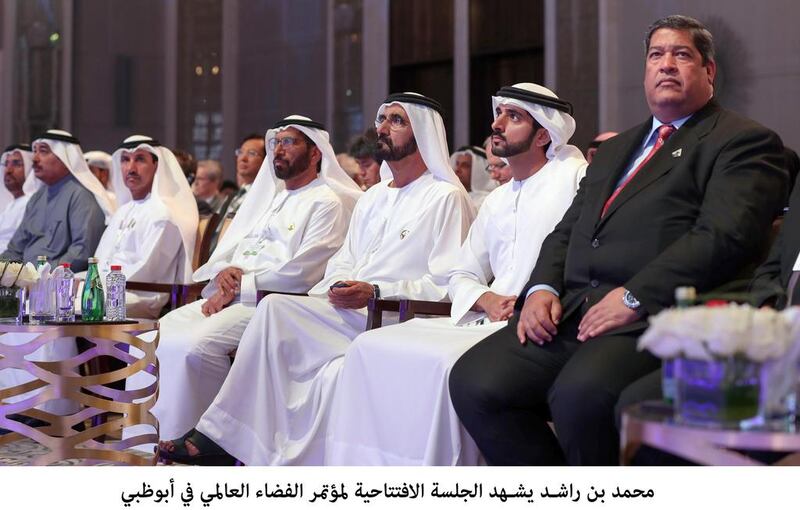ABU DHABI // Inspiring students through ambitious space exploration projects, role models and hands-on training are essential to ensure there is no brain drain from the space sector.
That was the view of industry leaders on the first day of the two-day Global Space Congress in the capital on Tuesday, attended by Sheikh Mohammed bin Rashid, Vice President and Ruler of Dubai, and Sheikh Hamdan bin Mohammed, Crown Prince of Dubai.
“The youth are the future of our space programme and bringing them to this platform gives them and opportunity to engage and exchange ideas with leaders in the space sector,” said Dr Mohammad Nasser Al Ahbabi, the director general of the UAE Space Agency, which hosted the inaugural event.
As well as connecting space agencies, companies and organisations, the congress invited young people to learn more about space through a number of workshops.
One such session was Airbus’ Little Engineer, which gave 25 pupils an opportunity to build, assemble and launch a model rocket for a Mars mission.
Nicholas Chamussy, Airbus executive vice president for space systems, said this was part of his company’s efforts to increase the space sector’s human capital around the world.
“We have a huge need for talent and need to hire more young people as we are an ageing population in the sector,” said Mr Chamussy, who added that Airbus has had to hire an average of 1,000 employees every year for the last three years.
Mr Chamussy said he was amazed with the speed with which the UAE was developing its space sector and said the industry could benefit from diversity of its population.
But creating a system where students can interact with real engineers and see space exploration projects they could potentially be involved in was essential.
“This is an industry of passion and if you never see, for example, a piece of hardware you are working on being sent to Mars, for example, why would you [care] enough to stay in the sector?” he asked.
Last week, Airbus teamed up with the UK Space Agency and British astronaut Tim Peak to open a science, technology, engineering and maths centre near one of their Mars rover exploration programmes in England.
Mr Chamussy said students could take classes at the centre and walk next door to see engineers working at a site that recreates the Red Planet’s terrain.
“They see it immediately and say, ‘this is why I am working on maths and sciences’,” he said.
The director of policy at the UK Space Agency, Dr Alice Bunn, said the centre was only part of the solution needed to inspire students.
“We absolutely recognise the need to keep fuelling the pipeline of scientist and engineers for the sector,” she said.
The UK had great success with engaging students in experiments being conducted by astronaut Peak on the International Space Station, she added, as well as inspiring them by viewing the launch of European Space Agency rocket.
“At the science museum we had 3,000 students spontaneously counting down to the launch of the rocket - this is an inspirational phenomenon I don’t believe you can find in other sectors,” Dr Bunn said.
tsubaihi@thenational.ae






